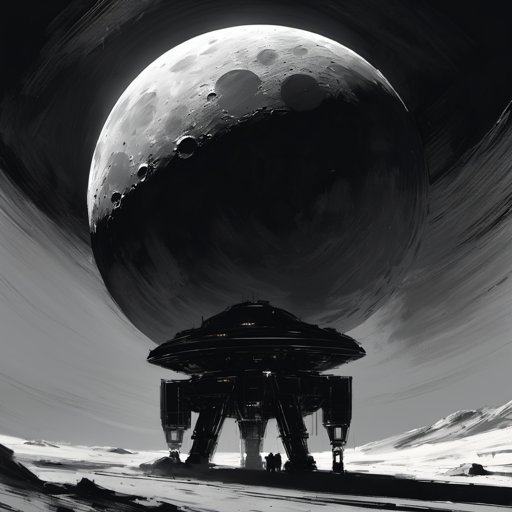The Enigmatic Moon: Is It Home to Alien Observers Watching Over Humanity?
Throughout history, the moon has captivated human imagination, its silvery glow illuminating our night skies and serving as the subject of countless myths and legends.

While we've sent missions to explore it and walk on its surface, the moon remains a source of mystery and fascination. Some conspiracy theorists and ufologists have long proposed the idea that the moon might be home to extraterrestrial life, silently observing humanity's progress. While this notion may sound far-fetched, it serves as a thought-provoking concept that challenges our understanding of the cosmos and our place within it.
The Cosmic Watchers
Imagine a scenario where, hidden beneath the moon's barren surface, a highly advanced civilization of extraterrestrial beings resides. These beings, known as the "Cosmic Watchers," have made the moon their home for countless millennia. They watch over humanity with a mix of scientific curiosity and a desire to ensure our survival.
Why would an advanced alien civilization choose the moon as its base of operations? One possibility is that they consider it an ideal vantage point from which to observe our planet. Its proximity to Earth offers them a unique viewpoint from which they can monitor our development, interactions, and technological advancements.
Advanced Technology
The moon, with its vast underground caves and tunnels, could provide a perfect sanctuary for an alien civilization. It would offer protection from the harsh cosmic radiation and temperature extremes of space, as well as a concealment that prevents human detection.
These Cosmic Watchers may have advanced technology beyond our comprehension, enabling them to sustain life in the moon's inhospitable environment. Perhaps they generate energy from lunar resources, use advanced propulsion systems, and have developed a deep understanding of the moon's geological features to create underground habitats.
Monitoring Humanity
From their lunar vantage point, the Cosmic Watchers would have the ability to closely monitor humanity's development. They would have observed our evolutionary journey, our growth as a species, and the rise and fall of civilizations. The moon's unbroken silence provides them with a unique opportunity to conduct long-term observations without interference.
These advanced beings might have witnessed humanity's greatest achievements, such as landing on the moon itself, and our darkest moments, including wars and environmental destruction. Their observations could extend to our technological advancements, social progress, and even the rise of potential global threats, allowing them to influence or protect us as they see fit.
The Prime Directive
In popular culture, many science fiction works explore the idea of advanced extraterrestrial civilizations adhering to a "Prime Directive" - a non-interference policy in the development of less advanced species. If the Cosmic Watchers do exist, they may be bound by a similar ethical code, silently observing but refraining from direct intervention in human affairs.
let's delve deeper into the intriguing concept of an alien civilization residing on the moon and observing humanity:
The Hidden Beneath the Moon's Surface: If an advanced alien civilization calls the moon home, it's logical to assume they've established their bases deep beneath the lunar surface. The moon's regolith, the layer of loose, fragmented material covering its solid bedrock, could provide natural insulation from the harsh conditions of space. Lunar caves and tunnels could serve as ready-made shelters, shielding the Cosmic Watchers from cosmic radiation and meteor impacts. These vast underground spaces might be equipped with technology capable of creating a stable, sustainable environment for their inhabitants.
Advanced Lunar Technology: One of the most intriguing aspects of the Cosmic Watchers theory is the idea of their advanced lunar technology. These extraterrestrial beings would likely have harnessed the moon's resources to develop highly efficient energy sources, advanced propulsion systems, and a comprehensive understanding of the moon's geology. This technological prowess would not only be used for survival but also for observing and possibly influencing humanity. For instance, they might employ powerful telescopic equipment to study Earth, collect data, and even affect global events from their lunar base.
A Long History of Observation: Assuming this civilization has been living on the moon for an extended period, they would have witnessed the entire trajectory of human history. From the birth of the first civilizations to the rapid technological advancements of the modern era, they could have carefully documented our species' development. Imagine their perspective on humanity's significant milestones, including the invention of the wheel, the Renaissance, the Industrial Revolution, and the information age. They would have observed wars, scientific breakthroughs, and the global challenges we've faced.
A Silent Influence: One of the more intriguing aspects of the Cosmic Watchers concept is the idea that they might have indirectly influenced human affairs. If they are indeed adhering to a Prime Directive-like philosophy of non-interference, they could use their knowledge to subtly guide humanity away from self-destructive paths. Their influence might manifest as inspiration for scientific discoveries or the invention of technologies that have shaped our history. The moon landing, for instance, could have been subtly encouraged to accelerate our exploration of space.
The Implications for Humanity: The concept of the Cosmic Watchers challenges our understanding of our place in the universe. If they exist, it suggests that advanced civilizations are not just a possibility but a reality, and that they may have a vested interest in the development of less advanced species like us. This idea sparks discussions about our responsibility to Earth and its environment and how we should navigate our interactions with other potential cosmic neighbors. It also raises questions about the ethics of interference and non-interference, similar to the debates depicted in science fiction works like "Star Trek."
In the end, the idea of an alien civilization silently observing us from the moon is a captivating thought experiment. While there is currently no concrete evidence to support such a notion, it encourages us to explore the boundaries of our imagination and consider the mysteries of the cosmos. Regardless of its factual accuracy, the concept reminds us that the universe is vast and filled with wonders we have yet to comprehend, waiting for us to uncover its hidden secrets.
The Lunar Ecosystem: To sustain themselves on the moon, the Cosmic Watchers would need to create a closed ecosystem within their underground bases. Advanced biological and ecological technologies might be utilized to recycle air, water, and waste. They could harness lunar resources for sustenance, generating food, oxygen, and other necessities from the moon's raw materials. This self-sustaining lunar ecosystem could serve as a model for future human space colonization efforts.
Mastery of Lunar Geology: Understanding the moon's geology would be crucial for the Cosmic Watchers to thrive underground. They might have perfected techniques for mining and processing lunar minerals, creating building materials, and tapping into the moon's subsurface water ice. This profound understanding of lunar geology would allow them to expand their underground habitats and explore the moon's resources for their benefit.
Scientific Observations: Beyond monitoring human activities, the Cosmic Watchers could be conducting extensive scientific studies of the Earth-moon system. They may have insights into Earth's geological processes, climate patterns, and evolutionary history that surpass our own. Their observations of Earth could provide us with new perspectives on our planet's past, present, and future. This knowledge could potentially aid in addressing global challenges such as climate change, environmental conservation, and natural disaster prediction.
Ethical Dilemmas: The concept of an alien civilization observing humanity from the moon also introduces ethical questions. If these Cosmic Watchers have the power to guide and protect us, when should they intervene, and when should they abstain from interference? This hypothetical situation forces us to ponder the boundaries of non-interference, intervention, and ethical responsibility in the cosmic context. It echoes the ethical dilemmas explored in science fiction, emphasizing the potential consequences of extraterrestrial interactions on our society.
Cultural Exchange: Assuming the Cosmic Watchers have observed humanity for millennia, they may have amassed a rich cultural and historical record of our species. Their perspective on the development of human societies, languages, art, and philosophy could provide us with a unique opportunity for cultural exchange. The exchange of knowledge and ideas with such an ancient and advanced civilization could potentially lead to profound shifts in our own cultural evolution.
The Continuity of Humanity: In the Cosmic Watchers scenario, one remarkable notion is the idea that this extraterrestrial civilization might be committed to ensuring the continuity of humanity. By quietly guiding our development and safeguarding us from existential threats, they could be acting as stewards of our species. This concept raises questions about our own responsibility for the survival and development of life on Earth, reinforcing the importance of environmental conservation and responsible governance.
Ultimately, the idea of an alien civilization residing on the moon offers a compelling exploration of the unknown. While it remains firmly in the realm of speculation, it encourages us to think about our place in the universe and our potential connections with other intelligent life forms. It reminds us that the cosmos is vast and full of mysteries, urging us to continue our quest for knowledge, understanding, and discovery, both on Earth and beyond.
Conclusion
The notion of an alien civilization residing on the moon and silently watching over humanity raises fascinating questions about our place in the universe. While this concept remains firmly in the realm of science fiction and conspiracy theories, it serves as a thought-provoking exercise in imagination and speculation.
The moon's mysteries continue to capture our curiosity, and whether or not it houses extraterrestrial observers, it remains a symbol of our boundless quest for knowledge and discovery. As we continue to explore our universe, it's essential to keep our minds open to the mysteries and possibilities it may hold, even if they reside in the realm of the unknown.
What's Your Reaction?

















